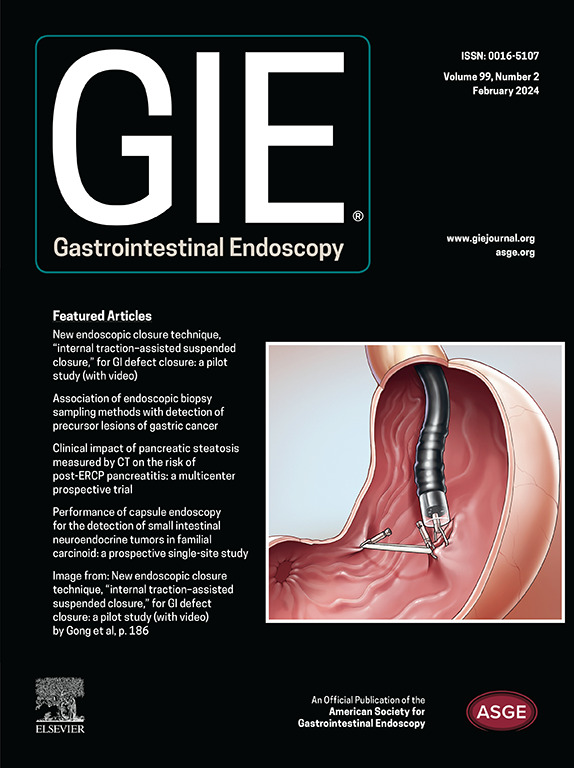美国胃肠内镜学会关于胃食管反流的诊断和治疗指南:总结和建议。
IF 6.7
1区 医学
Q1 GASTROENTEROLOGY & HEPATOLOGY
引用次数: 0
摘要
美国胃肠内窥镜学会(ASGE)的临床实践指南为诊断和治疗胃食管反流提供了循证方法。本文件是根据建议分级评估、制定和评估框架制定的,作为2014年ASGE内镜在胃食管反流病治疗中的作用指南的更新。这一更新的指南阐述了胃食管反流患者的内窥镜适应症,以及在套管胃切除术或经口内窥镜肌切开术后发生胃食管反流的新人群。讨论了如何在内镜下全面、统一地评价胃食管连接完整性。重要的是,本指南还讨论了胃食管反流的治疗策略,包括生活方式干预、质子泵抑制剂(PPIs)和内窥镜抗反流治疗(包括经口无切口灌底术[TIF]、射频能量、联合裂孔疝修补术和TIF [cTIF])在胃食管反流治疗中的作用。ASGE建议对有警示症状、Barrett食管有多种危险因素、有袖式胃切除术史的患者进行上消化道内镜检查。ASGE建议对接受上内镜检查的患者进行仔细的内镜评估、报告和客观GERD发现的照片记录,并注意胃食管交界处的标志和完整性,以改善护理。对于有胃反流症状的患者,ASGE建议改变生活方式。对于以烧心症状为主要症状的有症状和确诊的胃食管反流患者,ASGE建议医疗管理包括最低剂量、最短持续时间的PPIs,同时开始讨论长期管理方案。对于确认为GERD并伴有小裂孔疝(≤2 cm)且符合特定标准的Hill I级或II级患者,ASGE建议对TIF进行评估,作为慢性药物治疗的替代方案。对于持续性胃食管反流合并大裂孔疝(bbb2cm)和Hill分级III或IV级的患者,ASGE建议基于多学科回顾的cTIF或手术治疗。本文件总结了用于得出最终建议的方法、分析和决策过程,并代表了ASGE对上述主题的官方建议。本文章由计算机程序翻译,如有差异,请以英文原文为准。
American Society for Gastrointestinal Endoscopy guideline on the diagnosis and management of GERD: summary and recommendations
This clinical practice guideline from the American Society for Gastrointestinal Endoscopy (ASGE) provides an evidence-based approach for strategies to diagnose and manage GERD. This document was developed using the Grading of Recommendations Assessment, Development, and Evaluation framework and serves as an update to the 2014 ASGE guideline on the role of endoscopy in the management of GERD. This updated guideline addresses the indications for endoscopy in patients with GERD as well as in the emerging population of patients who develop GERD after sleeve gastrectomy or peroral endoscopic myotomy. It also discusses how to endoscopically evaluate gastroesophageal junctional integrity in a comprehensive and uniform manner. Importantly, this guideline also discusses management strategies for GERD including the role of lifestyle interventions, proton pump inhibitors (PPIs), and endoscopic antireflux therapy (including transoral incisionless fundoplication [TIF], radiofrequency energy, and combined hiatal hernia repair and TIF [cTIF]) in the management of GERD. The ASGE suggests upper endoscopy for the evaluation of GERD in patients with alarm symptoms, with multiple risk factors for Barrett’s esophagus, and with a history of sleeve gastrectomy. The ASGE recommends careful endoscopic evaluation, reporting, and photo-documentation of objective GERD findings with attention to gastroesophageal junction landmarks and integrity in patients who undergo upper endoscopy to improve care. In patients with GERD symptoms, the ASGE recommends lifestyle modifications. In patients with symptomatic and confirmed GERD with predominant heartburn symptoms, the ASGE recommends medical management including PPIs at the lowest dose for the shortest duration possible while initiating discussion about long-term management options. In patients with confirmed GERD with small hiatal hernias (≤2 cm) and Hill grade I or II who meet specific criteria, the ASGE suggests evaluation for TIF as an alternative to chronic medical management. In patients with persistent GERD with large hiatal hernias (> 2cm) and Hill grade III or IV, the ASGE suggests either cTIF or surgical therapy based on multidisciplinary review. This document summarizes the methods, analyses, and decision processes used to reach the final recommendations and represents the official ASGE recommendations on the above topics.
求助全文
通过发布文献求助,成功后即可免费获取论文全文。
去求助
来源期刊

Gastrointestinal endoscopy
医学-胃肠肝病学
CiteScore
10.30
自引率
7.80%
发文量
1441
审稿时长
38 days
期刊介绍:
Gastrointestinal Endoscopy is a journal publishing original, peer-reviewed articles on endoscopic procedures for studying, diagnosing, and treating digestive diseases. It covers outcomes research, prospective studies, and controlled trials of new endoscopic instruments and treatment methods. The online features include full-text articles, video and audio clips, and MEDLINE links. The journal serves as an international forum for the latest developments in the specialty, offering challenging reports from authorities worldwide. It also publishes abstracts of significant articles from other clinical publications, accompanied by expert commentaries.
 求助内容:
求助内容: 应助结果提醒方式:
应助结果提醒方式:


